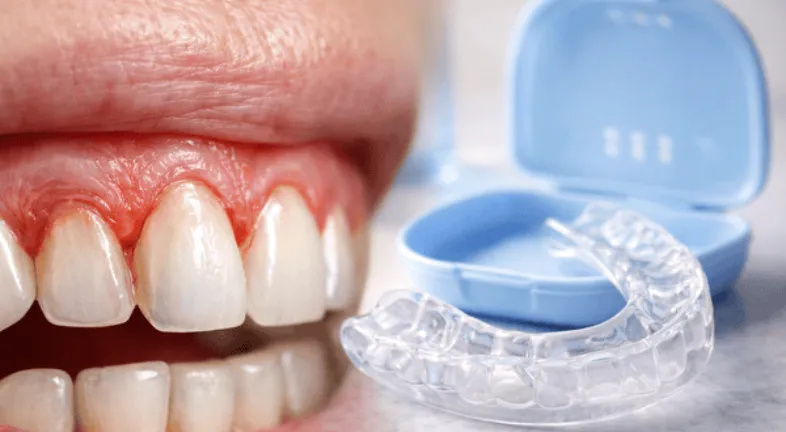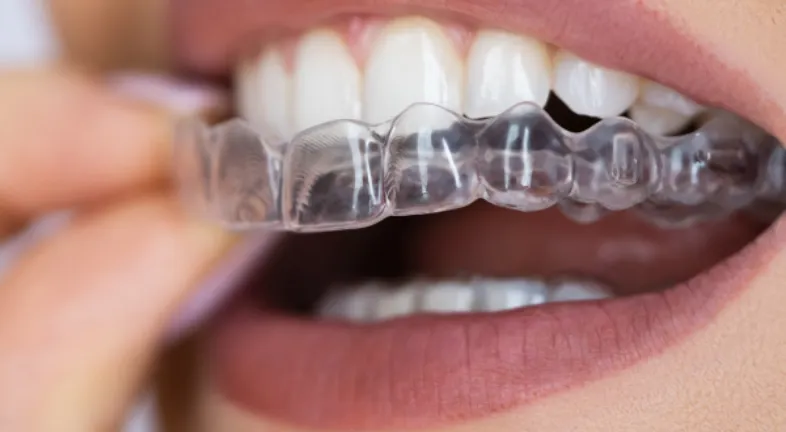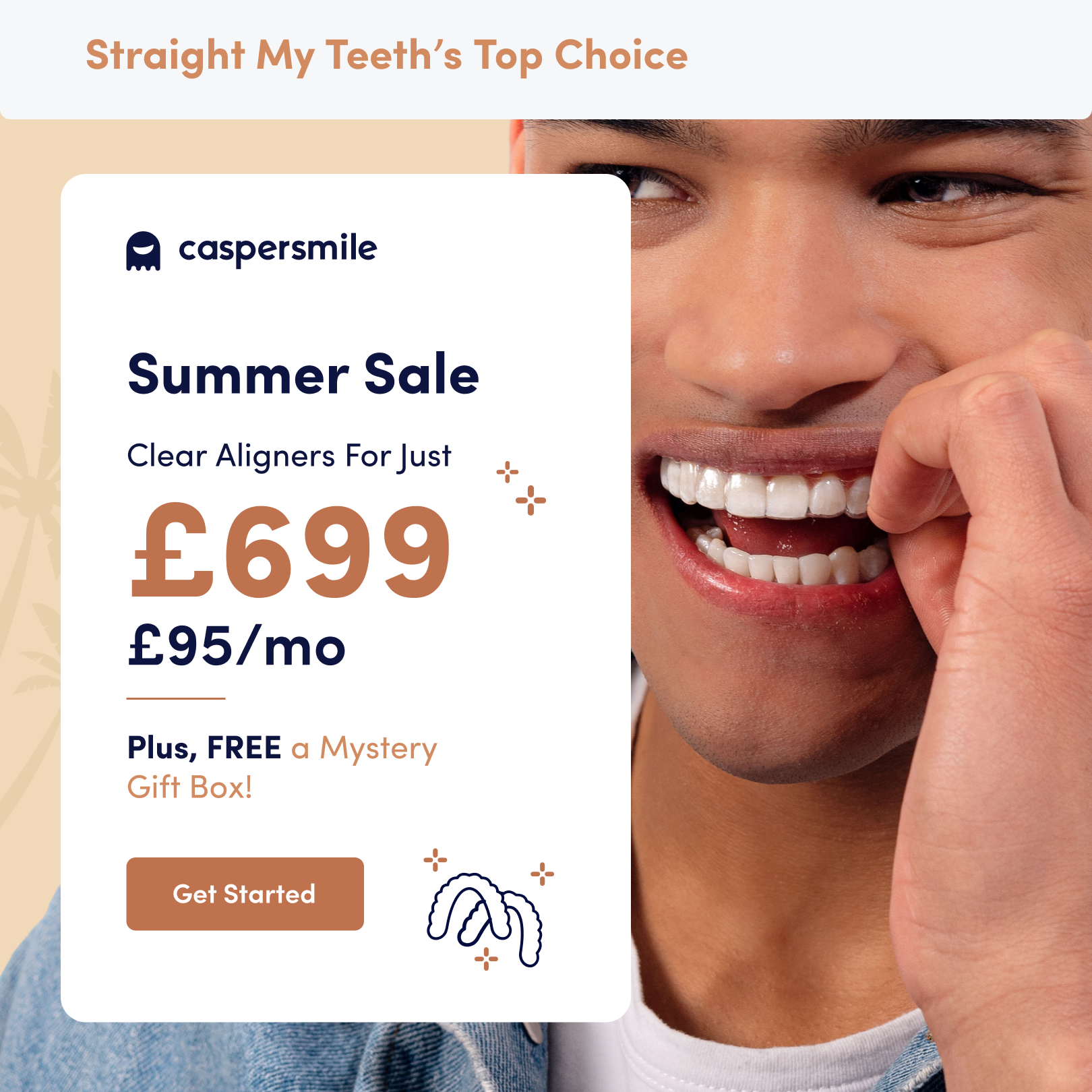
Table of Content
Do clear aligners hurt? This is a question that most people ask when considering teeth aligners vs metal braces.
There’s no denying that orthodontic treatment with metal braces can be uncomfortable initially. Patients should expect slight discomfort during treatment, particularly when wires are tightened to initiate further tooth movement. This is necessary to ensure teeth continue their journey towards correct alignment.
If you imagine traditional braces as a bit like having a metal fence around your teeth, it can feel uncomfortable and enunciation may become difficult, for a while at least.
Their conspicuous appearance makes for a distracting impression, and the daily task of cleaning teeth can become quite a chore. Fixed braces can also involve the time-consuming process of regular visits to your dentist every 4-6 weeks for tightening.
Clear aligners like Caspersmile are virtually unnoticeable, easy to manage, and in most cases, work more efficiently to straighten teeth.
Even better, studies revealed that clear teeth aligners cause less discomfort than metal braces during treatment.
We won’t lie. Yes, teeth aligners will probably cause a degree of discomfort but when compared to metal braces, any discomfort is minimal and for the most part, it occurs during the first three -seven days when an aligner is switched out for the next one in the series.
When a new aligner is first inserted over the teeth it can seem a little tight. This is because when an aligner is in position, it’s purposely custom-designed so that your teeth grow into it.
Teeth aligners are designed in such a way that most of the hard work of moving teeth is carried out during the first three to seven days. The remaining time of an aligner cycle allows for the newly formed bone tissue to catch up with the teeth and incremental movements are often smaller. Hence more discomfort in the early stages and less in the latter stages.
Any discomfort felt should easily be brought under control using over-the-counter pain medication like Aspirin.
In addition, once the tongue and cheeks adjust to the aligners, you’ll barely remember wearing them. Removing teeth aligners during meals also helps eliminate any discomfort during chewing or biting. But don’t forget to put them back in your mouth immediately after a meal or you could disrupt your treatment plan.
Do keep in mind that any soreness or discomfort indicates that the teeth are shifting and adjusting to their new positions. This is a sign that the teeth aligners are doing their job and your teeth are on the move.
Generally speaking, any teeth straightening device like metal braces, ceramic braces, lingual braces, or clear aligners will involve some level of discomfort. However, the discomfort with clear aligners is usually short-lived and fades quickly.
When a person wears traditional braces, the wires and brackets can and often do rub on gums and cheeks. Clear aligners are designed with a smooth surface that protects the gums and cheeks from injury.
There are several ways in which you can minimise any soreness or discomfort:
Wrap a pack of frozen peas or vegetables or an ice pack in a towel and place it gently against your cheek or jaw. You can repeat this several times a day, for up to ten minutes each time. Avoid letting the cold pack come into direct contact with your skin.
Drinking cold water can help alleviate discomfort and it works in the same way as a cold compress. The good news is that you don’t have to take out your teeth aligners to drink water.
Sucking on ice cubes can help reduce soreness in the mouth. Remember to suck and not chew, as chewing on ice cubes can damage your clear aligners and cause heightened sensitivity as well.
Over-the-counter painkillers can relieve discomfort and soreness. If you commonly experience discomfort when you wear a new set of aligners, it may be a good idea to take a painkiller before changing your aligners.
It can sometimes be difficult to get an aligner properly aligned. This is because each aligner differs slightly from the current position of the teeth. Help is at hand in the form of small soft plastic cylinders known as chewies.
Aligner chewies help to seat the aligner. Once the aligner is placed over your teeth, bite down on a chewie for a few minutes. Repeating the biting action several times will help the aligner mould better to the shape of your mouth.
Unfortunately, there will always be an element of discomfort or pain when the current aligner is replaced with the next in the sequence. While this pain cannot be avoided, a top tip is to replace the new aligners at bedtime.
Switching to a new set of aligners just before going to sleep can minimise discomfort for those first few hours. Making the switch just before bedtime can give your teeth time to adjust.
While it can be tempting to take the clear aligners out when they hurt, it’s important to continue to wear your new set of teeth aligners if you want the pain to subside. The soreness will disappear in a day or two after the switch.
So, now you know what to expect, why not take the next step to a brand new smile? A straight smile that you can be proud to show off.
Just imagine achieving the smile of your dreams in the coming new year. There couldn’t be a better time to start your aligner journey. Still a bit sceptical? Take a free assessment at Caspersmile to determine your eligibility for the clear aligner treatment.
Curated the best for your knowledge
.webp) Cavities: Why Cleaning Your Essix Retainer Is Important
Cavities: Why Cleaning Your Essix Retainer Is ImportantCavities do not usually start with pain; they begin quietly. A thin film of plaque forms, bacteria settle in, and before you realize it, enamel has started to weaken. The risk of cavities often increases when you wear oral appliances like Essix retainers. However, the retainer itself is not the issue; improper maintenance and neglecting cleaning are the main culprits. If you have invested in orthodontic treatment, whether traditional braces or clear aligners, your retainer is what protects that investment. But an unclean one just makes matters worse. So, let’s walk through this guide to understand why cleaning your Essix retainer is important.
Read More Can Mouthguards Cause Gum Recession
Can Mouthguards Cause Gum RecessionMouthguards are usually seen as the “good guys” of dental care. They protect teeth from grinding, cushion heavy bites, and help prevent long-term damage. So when someone notices sore or receding gums while wearing one, confusion sets in fast. Can mouthguards cause gum recession, or is something else going on? The honest answer isn’t a simple yes or no. Gum recession almost never has one single cause. It’s usually the result of pressure, inflammation, habits, and time all working together. Mouthguards can sometimes contribute to irritation, but in many cases, they’re actually helping prevent worse damage. Understanding the difference matters more than blaming the device.
Read More How to Clean Essix Retainers
How to Clean Essix RetainersIf you wear Essix retainers, commonly known as clear retainers, you already know they are both amazing and annoying. Essix retainers are nearly invisible, lightweight, and comfortable. At the same time, they stain easily, hold onto odors, and can appear questionable if not properly cared for. Cleaning Essix retainers sounds simple. Rinse, brush, done. But if you’ve ever pulled yours out of its case and wondered why it smells off or looks slightly yellow, you already know there’s more to it. In this blog, we will guide you through how to clean Essix retainers properly, what to avoid, how often to clean them, and why they change color over time.
Read MoreQuick Links

Heading